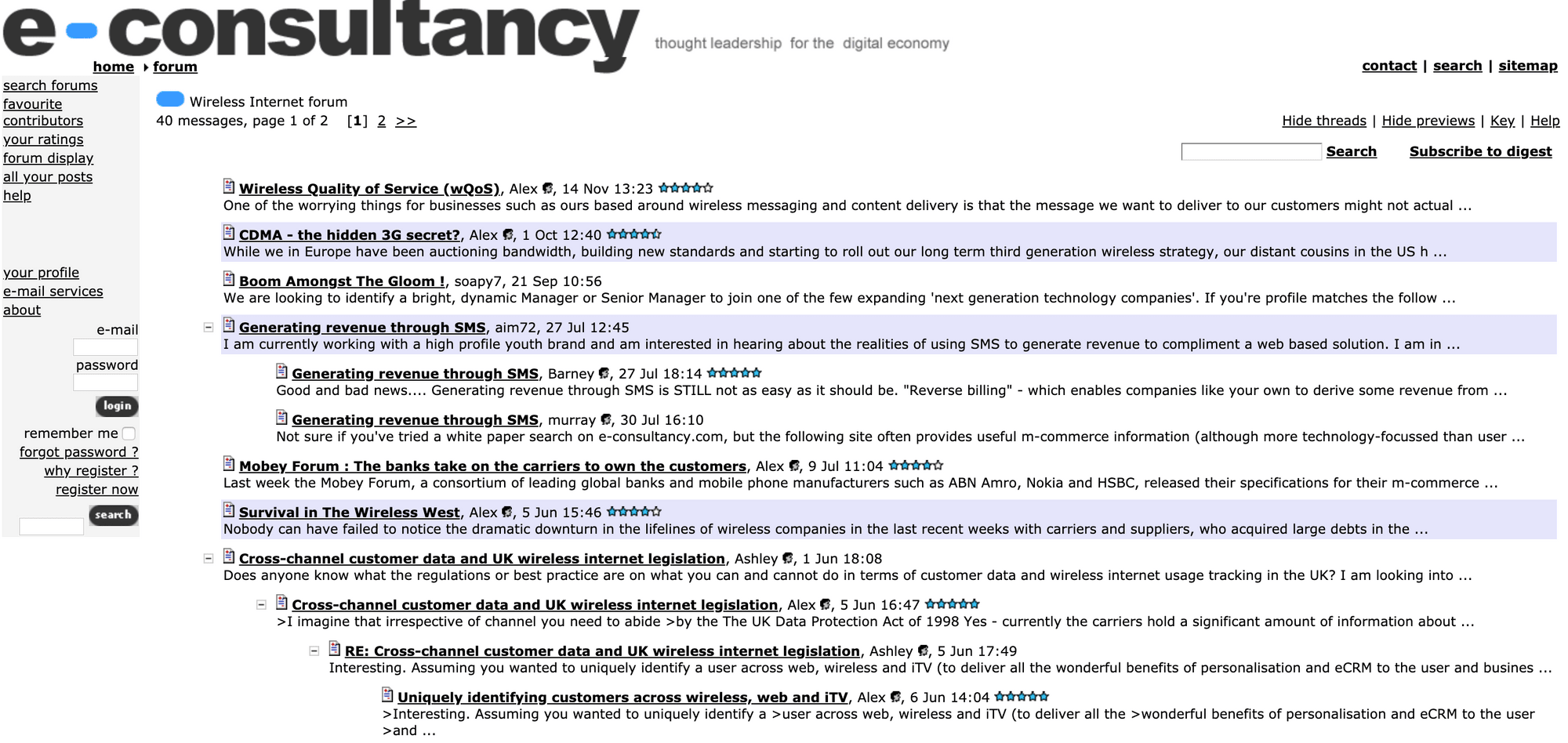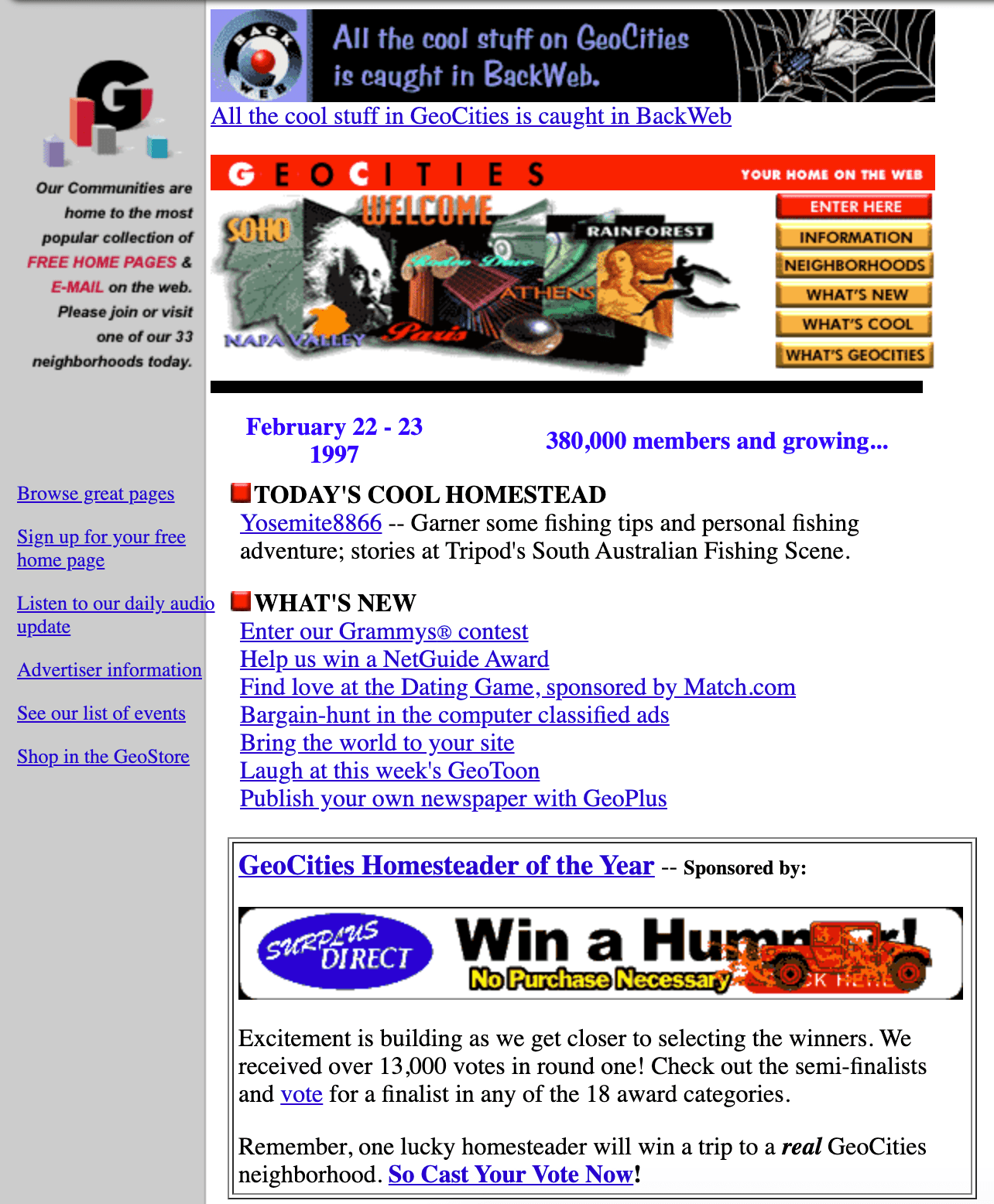The history of online communities
Here is a history of online communities.
I originally wrote this for the Guild website. Find the original article here.
This is an updated version.
What is an online community?
To understand what an online community is, you need to define the word 'community'.
The word suggests connectedness, togetherness, people joining and becoming something bigger than the sum of their parts. It's a positive, warm word.
There are many dictionary and wiki definitions out there, but here's my definition:
"A community is a social unit or group of people who share something in common, whether that is an identity, values, location, religion, a shared goal, roles or interests.
Communities share a sense of place. Whether that's a geographical area or a virtual or digital platform."
So, online communities are groups of people who share something in common AND share a digital platform to gather and communicate.
Those digital platforms have changed over time, and will continue to do so.
Where were the first online communities? A short history lesson.
Online community platforms have been around since the early 1970s.
The internet is a series of networked computers and people. By its very definition, it hosted online communities right from the very start!
I’ve tried to make sense of these early online communities and today's online community platforms, by categorising them into 4 distinct types:
Group Chat/Messaging
Virtual Worlds
Forums and Bulletin Boards
Web based communities/Blog networks
Social Networks
A visual timeline of the history of online community and social media platforms from 1970s to the present day ©Michelle Goodall
Group Chat / Messaging
From Plato to Geneva, via MSN Messenger, Skype, WhatsApp, Discord and Guild, group chat and messaging is the oldest category of virtual community platform.
Plato was one of the first University campus-based computer messaging networks that developed into very early bulletin boards and "term talk" for students and teaching staff in the early 1970s. A lot like Facebook, before Facebook was invented!
Today, chat and messaging online communities can be set up in minutes and are mobile-first. How many of us don't belong to multiple WhatsApp groups or Discord Servers?
Businesses are also discovering that messaging communities give them the power to beat the algorithm by creating communities in chat/messaging platforms.
Virtual Worlds
Virtual Worlds are online environments where users create a personal avatar, or profile. They can explore a virtual world or universe, participate in activities and communicate with others. Often these online communities place entertainment, fun, friendship and escapism at the heart of their offering.
Maze World was the first of these online communities, through to the likes of Habbo and Sweden's Dobedo at the turn of the century.
Dobedo was launched before the Habbo virtual world and the Swedish to English translations didn't always quite work!
The Second Life virtual world got brands and marketers excited about launching brands, products, books and virtual services in a universe, where literally anything could happen!
I was involved with VIP celebrity red carpet events. There was a memorable Richard Dawkins book launch in Second Life in 2004 where virtual hosts of heavenly angels arrived to make mischief. All manner of shenanigans happened in this virtual world as people and celebrities played with the technology.
Today, you can see all ages creating, exploring and escaping in the most popular Virtual Worlds; Minecraft, Animal Crossing and World of Warcraft.
Swedish Virtual World Dobedo was launched before the Habbo virtual world. The Swedish to English translations didn't always quite work!
Forums and Bulletin Boards
These were online communities where conversations took place in the form of posted messages and conversation threads and discussions often within websites. For example, Econsultancy.com's very early digital marketing forums in 2000 or thecybermoms.com, a forum on CyberMom, a US parenting site that billed itself as the '"Net for Moms with Modems".
Many of these forums and bulletin board community messages were pre-moderated by a community moderator before becoming visible.
Usenet was a platform of thousands of bulletin boards and forums, covering almost every topic under the sun. It was bought by Google in 2001.
Reddit forums are a direct descendent of the information rich and (usually) friendly, supportive world of Bulletin Boards and forums that many of us early internet users participated in.
Econsultancy.com's digital marketing forums in 2000TheCyberMom.com's chat forums in 1999 - 'The 'net for moms with modems'
Econsultancy.com's digital marketing forums in 2000
TheCyberMom.com's chat forums in 1999 - 'The 'net for moms with modems'
Web based communities/blog networks
These loosely networked online communities grew out of internet properties providing free web hosting, blogging and web publishing tools.
Lycos launched Tripod in 1992. Tripod was a blogging tool, a photo album manager, users could build simple websites and connect to other member 'web logs' or 'blogs' on the Tripod platform.
Along with Geocities and The Globe, these preceded the more familiar blog platforms of the late 1990s and early 2000s such as Blogger, Wordpress and Tumblr. Medium, launched in 2015, is one of the newer examples of a blog community.
Substack is placed in this category and is much more of an extension of the newsletter.
It places less emphasis on connecting a network of similar content and much more emphasis on the monetisation of creator content through subscriptions. Substack takes a percentage of the subscription revenue.
Look at all the 'cool stuff' that 380,000 Geocities members were creating in 1997
Social networks - are they online communities?
The rise of Social networks such as Mixi, Cyworld, MySpace, LinkedIn and Facebook in the early 2000's meant that suddenly the idea of online or digital communities became attractive to many organisations and brands.
They were able to create and engage with a large community of fans and followers in Facebook and LinkedIn Groups, MySpace, Orkut or Bebo in their branded spaces.
But social media platforms are generally ad-funded businesses. Providing software and community platforms for free isn't a long-term strategy that keeps shareholders happy.
In 2012 Facebook ads became available to all through their self-serve ad platform. Within a couple of years, many community strategists realised that they would have to pay-to-play in Facebook or move their Facebook Page community back to Facebook Groups if their community were to stay visible as the algorithms took hold.
LinkedIn Groups can be a space to build and engage with professional online communities. For many years, they were the go-to platform for B2B communities.
But increasingly businesses are looking to integrate digital communities and data with their techstack, or to monetise them in some way. Creating communities on social networks is relatively simple for brands, but it is not without risk.
The more recent social networks are highly visual (TikTok and BeReal) or have been developed as an alternative to Twitter (BlueSky and Threads).
Further reading
I’ve created a community glossary and I also explain key concepts in community strategy, community building and community management.
Here are some connected articles that you may find helpful:
What is a Community Qualified Lead (CQL)? And how does it differ from a MQL or PQL?
The definitive community glossary A - Z
What is Community Everywhere / what are Community Ecosystems?
What is Community Led Growth - is it the same as Community Based Marketing (CBM)?
What is Minimal Viable Community (MVC)?
What are rituals in community building and why are they so important?
What are the 5 Ps and 1 C of community?
What is Broken Windows Theory and does it apply to Community Management?
What is Community Manager Appreciation Day (CMAD)?
Why we need to ban the term ‘lurkers’ in community strategy
Book a Free Consultation
Want training, help or support with your community strategy or community building? I’m ready and waiting to hear from you. Book an introductory call to discuss your needs.
Photo by Michelle Goodall©






